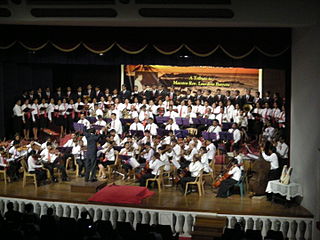Old Goa is a historical site and city situated on the southern banks of the River Mandovi, within the Tiswadi taluka (Ilhas) of North Goa district, in the Indian state of Goa.

Konkani is an Indo-Aryan language spoken by the Konkani people, primarily in the Konkan region, along the western coast of India. It is one of the 22 scheduled languages mentioned in the Indian Constitution, and the official language of the Indian state of Goa. It is also spoken in Karnataka, Maharashtra, Kerala, Gujarat as well as Damaon, Diu & Silvassa.

António de Andrade was a Jesuit priest and explorer from Portugal. He entered the Society of Jesus in 1596. From 1600 until his death in 1634 he was engaged in missionary activity in India. Andrade was the first known European to have crossed the Himalayas and reached Tibet, establishing the first Catholic mission on Tibetan soil.
The Messenger of the Sacred Heart is a Roman Catholic periodical; the print organ of the Apostleship of Prayer, a pious association founded in nineteenth century France by the Jesuits. There are many editions in various languages, promoting devotion to the Sacred Heart of Jesus. In the late 1940s, The Messenger was banned in many Soviet Block countries.

Bastora is a village in North Goa, India. It is located on the outskirts of Mapusa town. Green and still scenic, this is one of the many communities and villages that makes up mainly-rural, but fast-urbanising Goa.

Siolim is a village in Bardez taluka, and a census town on the central west coast of India, in the North Goa district of Goa. The 2001 population was 10,311, and 10,936 in 2011. Siolim is also the name of a constituency in the Goa assembly, which includes Assagao, Anjuna and Oxel, in addition to Siolim. A person from Siolim is known as a Siolcar or even as Shivalkar.
Goan Catholics are an ethno-religious community of Indian Christians adhering to the Latin Rite of the Catholic Church from the Goa state, in the southern part of the Konkan region along the west coast of India. They are Konkani people and speak the Konkani language.
Goan Catholic literature is diverse.

The Rachol Seminary, also known today as Patriarchal Seminary of Rachol, is the diocesan major seminary of the Primatial Catholic Archdiocese of Goa and Daman in Rachol, Goa, India.
Moreno de Souza was a Goan Jesuit priest and Konkani Marian poet, Konkani writer, translator and a historian. He was one of the translators of the Povitr Pustok in Romi Konkani.

Konkani in the Roman script, commonly known as Roman Konkani or Romi Konknni refers to the writing of the Konkani language in the Roman script. While Konkani is written in five different scripts altogether, Roman Konkani is widely used. Roman Konkani is known to be the oldest preserved and protected literary tradition beginning from the 16th century AD.

The Santa Cecilia Choir is a polyphonic male choir composed of seminarians of the Rachol Seminary of the Catholic Archdiocese of Goa and Daman in Goa, India.
The Rotti Press is the only printing press in Pakistan owned by the Roman Catholic Archdiocese of Karachi. The press is located in Blenkin Street, Saddar, Karachi.
Étienne de la Croix SJ, was a French Jesuit, missionary to India and author of a life of St Peter in Marathi: Discurso sobre a vida do Apostolo Sam Pedro em que se refuta os principaes erros do gentilismo.
Goa is India's smallest state on the west coast, and its writers have written in many diverse languages. Poetry is a small and scattered field in the region, and this page makes an attempt to acknowledge those who have contributed to the field. It includes those listed below who have contributed to poetry in and from Goa, as well as those writing poetry in Goa. Poetry related to Goa is known to have been written in Konkani, in Portuguese, English and Marathi, apart from other regional, national and international languages to a lesser extent.
The Sacred Heart of Jesus, Church is a historic Roman Catholic Church situated at Madanthyar near Belthangady. The church was built on 29 January 1893. This church comes under Deanery of Belthangady, Roman Catholic Diocese of Mangalore. This church is dedicated to Sacred Heart of Jesus.
Fr. Vasco do Rego SJ was a Jesuit priest from the region of Goa, who played a significant role in the promotion of Konkani language, literature and music, particularly after the Annexation of Goa. He was the editor of the religious monthly Dor Mhoineachi Rotti for many years.
Gaionancho Jhelo is the official hymnal of the Archdiocese of Goa and Daman. It was first published a few years after liturgy in vernacular languages was introduced in the Second Vatican Council. The latest edition was brought out in 1993.

Nevel Lourdes Sacramento Gracias was an Indian playwright, actor, singer, composer, director, editor, and diocesan priest who primarily worked on the Konkani stage and is best known for his lenten tiatrs. He was regarded as a one-man show and served in the general council of the Tiatr Academy of Goa.

Caetano Manuel Pereira, known professionally as Kid Boxer, was an Indian singer, writer, director, comedian, and lyricist who worked on the Konkani stage. He is best known for being the member of the popular Kid-Young-Rod trio.









